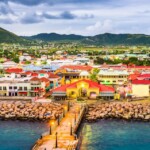How to acquire a Malta Visa or Permit?
All foreign nationals are required to possess a legal Malta visa or permit, depending on the purpose of their visit. Foreign nationals who are visiting or planning to reside in Malta, be it for studying or working in Malta, need to apply for Malta Schengen Visa.
European Union (EU), European Economic Area (EEA), and European Free Trade Association (EFTA) citizens do not need an entry visa or permit to work in Malta. This is only for nationals who are registered under the Department for Citizenship and Expatriate Affairs within three months of their arrival in Malta. For other foreign nationals, they will need to apply for a Malta visa or permit. There are three types of Malta permits you can apply for when third-country nationals are planning to stay in Malta – the single permit, the national D visa, and the employment license.
Residence Permit or Single Permit
A single permit is known as the joint Employment License and Residence Permit, which is now called the Maltese-e-residence card. The process includes background checks where your identity will need to be verified, as well as a labor test to confirm the designation has been offered to Maltese or EU citizens formerly.
Applicants from third countries generally apply through the local embassy or consulate of their home country. Furthermore, the employer will apply for a single permit to receive authorization. However, you need to keep the following pointers in mind while applying for a single permit. They are:
- Employment contract
- It can take up to two to three months
- E-Residence Card applies to one employer and one designation
- The permit is non-transferable
- It lasts for a year and then it will need to be renewed
- The employee needs to submit all necessary documents
The process to apply for a Single Permit is:
(For the employer)
- Will first try to recruit the vacancy locally or within the EU before applying for a single permit for a third-country national
- Submit a letter that shows the reasons for offering the position to any third-country national attaching the copies of the vacancy advertisement to the Employment and Training Corporation. However, there are some exceptions for recruitment in the following areas: health, building professionals, computer engineers, finance, IT gaming professionals, and education.
- Purchase private medical insurance. This step is essential for the employment license as it covers the contract’s duration. Ensure to attach the premium receipt with the application
- Single permit fee of €280.50 which is non-refundable, albeit rejection of the application.
(For employees)
- Job offer along with employment contract
- Provide all required documents for a single permit to the employer, as the employer needs to apply for a single permit with a single procedure application that includes employee license and residence permit (E-Residence Card)
- Once a single permit is approved, Identity Malta sends an Authorization to the employee and employer to apply for an entry visa
- Employee needs to apply for National D Visa to enter Malta and complete the E-Residence Card procedure
Key Employee Initiative (KEI)
Key Employment Initiative (KEI) allows specialized Third Country Nationals (TCNs) to work in Malta at a designation of managerial staff or highly positioned technicians. The Key Employment Initiative also includes entrepreneurs and start-up businesses that are legally recognized by Malta Enterprise. You can apply for a single permit that includes the employment license and residence permit but offers you a faster way to work in Malta. Keep the following pointers in mind.
- An employment contract is required
- It will take five working days
- Gross salary over €30,000 per annum
- Applicants need to submit completed application Form C5 and relevant documents
- Employment license
- Applicants need to be qualified
- Declaration by the employer regarding the qualifications of an employee in lieu of the position description
Why do you need KEI?
The key employment initiative is required to fast-track prospective managerial and technical applicants based on their skills. This scheme helps to streamline the application process in five days to expedite skilled employees in their respective designation and workplace.
The EU Blue Card
Third-country nationals need a work permit and residence permit. Also, their employer will need to apply for an employment license. They need to have an employment contract for at least a year, which will also state the minimum salary which is 1.5 times Malta’s average annual salary. The jobs that come across this application will be labor tested in the market as well as in terms of immigration and health by the immigration laws. They also require a valid visa, relevant documents, and proof of existing health insurance. The EU Blue Card is available to third-country nationals who are applying as highly-skilled individuals in the workplace.
However, there are certain pointers you need to keep in mind before applying, they are:
- Employee contract
- Employer applying for an employment license
- Offering a salary that is 1.5 times that of the average Maltese company/companies
- Acceptance after labor market test
- Possess the required qualification and experience certificate
How can you apply for a work permit in Malta?
To work in Malta, third-country nationals need to have certain documents and Malta permits.
National D Visa
After an employer applies for a single permit, the employee will need a National D Visa to enter Malta and stay for longer than three months. There are certain things that you are required to have when applying for the National D visa, they are:
- Signed, dated, and completed application form
- Valid passport with blank pages for stamps
- Formatted passport photo in a white background
- Itinerary of stay in Malta, confirmed accommodation as well as receipt of return airline ticket
- Last six month’s bank statement to prove financial stability
- Medical insurance for the Schengen area, minimum coverage of €30,000
- Contract of employment/letter with proof of employment that describes salary, job description, address in Malta, and duration of employment
- An authorized copy of the employment license/residence permit
- Confirmed letter of employment by Citizenship and Expatriate Affairs Department
- Letter of no objection by a former employer
Single Permit
A Single Permit/Single Procedure is required by third-country nationals to work in Malta along with an employment license and residence permit. A foreign national needs to prove their relevant experience, skill, and qualifications to obtain the permit. The employer applies for the process as many third-country nationals live outside Malta to the Employment and Training Corporation. Note that EU nationals need to apply for the single permit procedure.
The documents that are essential to apply are:
- The employer needs to complete a single procedure application form for the employment license and residence permit as well as a few of €280.50
- Passport copy of all documents along with a photo
- Evidence of labor market considerations
- Letter of the job description, signed and stamped by employer
- Contract of employment confirming salary, job description, duration of employment, and address in Malta (employer and employee need to sign)
- Signed CV by the employee
- Important documentation that includes qualifications, certificates and proof of experience
- Proof of insurance
What does the permit not cover?
- Any paid work to an employer other than the one mentioned on the permit
- Any paid work other than the roles and duties mentioned on the permit
After the entire process takes place with the approval of applications, foreign nationals can travel to Malta to complete the process of the E-Residence Card, and Temporary Authorization to Work.
How much does a Malta Work Visa cost?
The cost of a Malta Work Visa varies from visa to visa that an employee or employer is applying for. The amount of the visas are as follows:
- Single Procedure: this includes employment license and E-Residence Card which comes to €280.50
- Employment License: €150
- EU Blue Card: €140
- Type D National Visa: this depends on the country of the applicant
- Type C Schengen Visa: A type C Visa comes to €80 which an individual pays at the Maltese Embassy or Consulate in the employee/employees country.
Note: The Type C Visa is for foreign nationals who travel to Malta and can enter the Schengen area. An individual needs to fill up the visa application form along with a cover letter stating the purpose of the visit. The applicant can get hold of the form free of cost from Malta’s diplomatic missions and consular posts.
Working Visa and Permit for Malta
Visas and permits are required for non-EU nationals who want to work and travel to Malta for longer than three months. As mentioned earlier, third-country nationals will be required to apply for a single permit to reside and work in Malta, a national long-stay visa, or a D visa.
- Single Procedure: Authorization granted to foreign workers to work in Malta and work for a prolonged period of time, eg: more than three months.
- National D Visa: Authorization of foreign employees who can live and work in Malta.
EU nationals however will not need a visa to stay in Malta but may need to apply for temporary residence.

Other routes for working in Malta
- The Key Employee Initiative: this process fast tracks an employee who has applied for managerial and technical designations.
- EU Blue Card: this is a work permit as well as a residence permit.
- Single Procedure: the approval of both employment license and residence permit grants foreign employees to travel to Malta and complete procedures.
Frequently asked questions on Malta Work visa
How do I get a work visa for Malta?
If you are planning to work in Malta you can get your single procedure by following the steps mentioned below:
- You need a job offer and employment contract in Malta
- Provide the necessary documents as required by your employer to apply for the single procedure, employee license, and residence permit
- After receiving your authorized single permit, you will need to travel to Malta for your entry visa
- Apply for National D Visa
- Complete the procedure of the E-Residence Card.
Is it easy to get a work permit in Malta?
It is easier to get a work permit in Malta if you fit the qualifications and skills demanded by the employer.
What is Malta work visa fee?
The work visa costs are as follows:
- Single Procedure: €280.50
- Employment License: €150
- EU Blue Card: €140
- Type D National Visa: this depends on the country of the applicant
- Type C Schengen Visa: €80
How long does it take to get a work permit in Malta?
For the single procedure, it takes around two to three months. Whereas the key employee initiative process takes around 5 days.
What are the Malta work permit benefits I can enjoy?
You can enjoy all the perks given by Maltese companies to their employees. Apart from these benefits, you also get to hone your skills and upgrade your qualifications for better employment opportunities.


